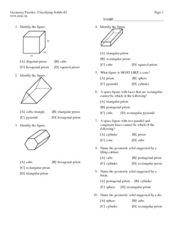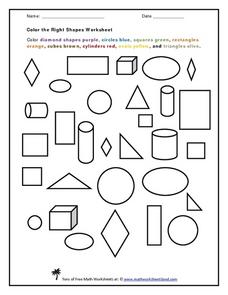Math Worksheets 4 Kids
Sorting 2-D and 3-D Shapes
Challenge mathematicians to examine and sort a variety of 2-D and 3-D figures with a 10-problem solid shapes instructional activity.
Curated OER
Geometry Practice: Classifying Solids #2
In this solids worksheet, students identify the characteristics of solids. They name solids and determine the number of faces. This three-page worksheet contains seventeen problems. Answers are listed on the last page.
MENSA Education & Research Foundation
Shapes - Kindergarten
Extend scholars' learning experience with a unit consisting of five shape lesson plans, an extension activity, assessment, and rubric. Begin by reading a story about shapes, then conduct an overview and assign pupils' their first...
Curated OER
Comparing 3-D Shapes
How is a sphere like a prism? Learners compare and contrast 3-D shapes, first drawing each in the boxes provided. If this is too advanced, supply pre-cut images of the shapes for students to choose from and glue onto the learning...
Curated OER
Write the 3-D Shape's Name, Part 2
Geometry can be fun when you know the shapes! Twelve pictures of geometric shapes, including cones, pyramids, and spheres, prompt first graders to write the name of each shape in the space provided. Use the activity as a quiz or homework...
Curated OER
Recognizing 3-D Shapes, Part 2
Take your math lesson to another dimension with this lesson about 3-D shapes! First graders label cones, cylinders, pyramids, spheres, cubes, and prisms, and then count the number of each shape in a collective picture. A great way to...
Curated OER
Sorting 2-Dimensional Shapes
Explore shape attributes with young geometers as they sort nine shapes based on their corners. Scholars determine whether or not each shape has a square corner, drawing it in the appropriate space accordingly. They are encouraged to use...
Curated OER
2-Dimensional Shapes: Naming Shapes
Get to know eight shapes by name: square, rectangle, triangle, pentagon, hexagon, and octagon. Young geometers write the correct name below each of these shapes, using a word bank for guidance. Then, they draw two of the...
Curated OER
2-Dimensional Shapes: Drawing Shapes
Some of the best practice with shape identification comes from drawing the figures first-hand. Young geometers draw nine two-dimensional shapes: rectangle, circle, square, pentagon, hexagon, octagon, triangle with three equal sides,...
Math in English
3-D Shapes
Young mathematicians look at five 3-D shapes and name them based on the accompanying image. For each shape, learners state the number of faces, vertices, and edges.
Curated OER
Shapes: Art or Geometry
Budding artists or mathematicians read about,and then draw, two very different shapes. Geometric and organic 2-D shapes are defined. Learners use the definitions to draw examples of each.
Curated OER
Color the Right Shapes
I remember doing this activity when I was little. Learners color each shape the color indicated at the top of the page. Squares are blue, cubes are red, circles are green and so on. There are 30 shapes to identify and color.
Mathed Up!
2D and 3D Shapes
What a great assessment to give young mathematicians in order to test their knowledge on two- and three-dimensional shapes. Learners name various shapes, identify the number of edges, faces, and vertices, match an unfolded version of a...
Learner
Solid Shapes
A collection of two lessons, kindergartners will identify two-dimensional shapes in solid shapes. They will develop basic knowledge of the components that make up a sphere, rectangular prism, pyramid, cylinder, cone, and cube. Young...
Curated OER
Sorting 3-Dimensional Shapes
Three-dimensional shapes can be categorized based on their attributes, and scholars learn more about six figures through this sorting activity. They examine six shapes: sphere, cylinder, cone, cube, prism, and pyramid....
World Wildlife Fund
Arctic Shapes
In a two-part worksheet, young geometers examine 3-D shapes and describe their attributes in a table. They will be able to draw the shape and name the number of vertices, faces, and edges. In the second part, individuals explore...
Technical Sketching
Introduction — Surfaces and Edges
How different can 3-D and 2-D really be? An engineering resource provides an explanation about the importance of two-dimensional technical drawings. Several samples show how to create multi-view drawings from pictorials and...
Curated OER
Views of Shapes
In this math worksheet, learners examine the two and three dimensional shapes. They use the observations in order to define the different points of view.
Curated OER
Making Two-Dimensional Shapes
Find the shapes that fit. Pupils explore visual discrimination in a set of geometry worksheets, which has them examine shapes that have been divided in half. They observe a set of shapes to determine which of them would fit into each...
Curated OER
Making Two-Dimensional Shapes
Which shapes fit? Learners practice visual discrimination using a geometry worksheet, which has them examine shapes that have been divided in half. They observe a set of shapes to determine which of them would fit into each half of the...
Curated OER
Making Two-Dimensional Shapes- Matching Worksheet
Now that your learners recognize two-dimensional shapes, can they find what each half of those shapes would look like? There are seven shapes on this activity, bisected by a dotted line. Scholars examine these shapes and match them to a...
K12 Reader
Shapes on a Plane
Geometric shapes are the focus of a comprehension exercise that asks readers to examine a short passage about planes, circles, triangles, and rectangles, and then to respond to a series of questions about the article.
K12 Reader
3-D: It’s Not Just for Movies
This two-part reading comprehension exercise asks kids to read a short passage about cubes, rectangular prisms, spheres and pyramids, and then to respond to a series of questions about the article.
Curated OER
Understand Categories of Shapes
This colorful set of shapes and figures is the data set learners need to fill out an extensive table. For each of 11 types of shapes or figures they record the quantity and how many corners and sides each has. This becomes more difficult...























